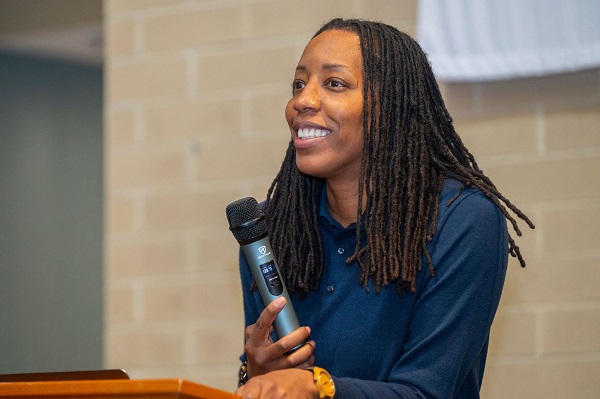Educator and author Bettina L. Love addresses access, success and equity in education as part of CASE Summit, Centennial lecture
Educator and author Bettina L. Love addresses access, success and equity in education as part of CASE Summit, Centennial lecture

Maintaining that our nation is in “a perpetual state of adolescence,” educator and author Bettina L. Love urged attendees at Rowan University’s CASE Summit on April 23 to gain a deeper understanding of the failings of educational reform over the past few decades as they move forward to address issues of access, success and equity in education.
In an address that earned a prolonged standing ovation from the crowd in Rowan’s James Hall, Love said education in the United States is failing students, particularly those in Black and brown communities. Many of those failures, she said, can be attributed to reform measures not based on data, the merging of education reform with crime reform, and the lack of funding for education in communities of color.
Presented by the Center for Access, Success & Equity in the College of Education, Love’s talk was part of the University’s Centennial Lecture Series, which has brought prominent speakers to campus in celebration of Rowan’s Centennial year.
Today a top 100 public institution, Rowan was founded in 1923 as a normal school to train South Jersey teachers. Thus, the College of Education also is marking its Centennial this academic year.
A leading voice in the field of education and social justice and a pioneer in abolitionist teaching in the United States, Love was the keynote speaker in a half-day conference presented by CASE focused on addressing persistent educational challenges in American education.
Love, who holds the William F. Russell Professorship in the Foundations of Education at Teachers College, Columbia University, is the author of the 2023 New York Times best-selling book, “Punished for Dreaming: How School Reform Harms Black Children and How We Heal.” The book outlines the adverse effects of decades of education reform on Black students.
The title of Love’s talk was, “Punished for Dreaming: The Case for Abolitionist Teaching & Educational Reparations.”
In her address, Love discussed educational reform efforts—from “A Nation at Risk” to “Chaos in the Classroom” to “No Child Left Behind” —and outlined how they used inaccurate, incomplete data that was detrimental to children, particularly children of color.
“A Nation at Risk” in the 1980s “cherry picked the data” to implement educational reforms that led to increased emphasis on standardized tests, Love said.
Meanwhile, “Chaos in the Classroom,” another education report published in 1984, merged education reform with crime reform, maintaining that kids were “rude, unruly and violent in schools,” Love said. Data showed that was inaccurate, she said. So, too, was data used for 2001’s “No Child Left Behind,” which was punitive in nature, according to Love.
Love also discussed Brown v. Board of Education of Topeka, the Supreme Court ruling that determined that racial segregation of children was illegal. Widely considered a major victory for civil rights, the ruling dramatically impacted children of color, particularly in southern schools, Love said.
Handed down 70 years ago next month, the ruling effectively gutted Black education in the South, where schools were led by established, accomplished Black educators, according to Love.
Today, Black women make up less than 7 percent of teachers, while Black men make up less than 2 percent, she noted. Meanwhile, Love said, 80 percent of all teachers are white women. All students, she added, benefit from having teachers of color.
“You need diversity. You need diversity of thought, diversity of ideas,” she said.
Today, bans on books, divisive rhetoric and the teaching of critical race theory are the latest assaults on education, Love noted.
“We’re creating educational policy not based on data, not based on facts,” Love said. “It’s based on nothing but lies and fear of Black and brown folks.
“We’re seeing small groups of people changing the course of American education. Their rage is fueling the adolescent state.
“This country will benefit if it learns about Black people and Indigenous cultures. This is all of our cultures.
“Much of why we are failing is that we are refusing to see each other.”
Educational inequities are tied to economics, said Love, who included the writings of James Baldwin, Toni Morrison and Martin Luther King Jr. in her talk. White schools, she said, receive $23 billion more in funding that schools of color.
“You can’t do educational equity without money,” Love said, noting that Americans have to fight collectively to save education and that economic justice and educational justice go hand in hand.
People of color have fought for years to move the nation past its “perpetual state of adolescence,” Love said.
“We are fighting for the basic rights to be human every day,” she said. “What have we asked for that’s radical? What’s radical is that we keep loving, we keep fighting, we keep dreaming.”
While Love was the keynote for the CASE Summit, Daniel F. Oscar, founder of Realign Education, was the closing speaker. Oscar has centered his life’s work on educational equity. Realign Education partners with the larger K-16 ecosystem to challenge the outdated, predominant model of education in the United States that falls short of addressing the needs of the nation, families, communities and children.
Also during the summit, College of Education professors led seven morning workshops that highlighted their research and expertise on issues related to access, success and equity in education.
“The Center for Access, Success & Equity strives to provide opportunities to engage our communities of students, teachers and leaders who are interested in improving the quality of education,” said Tyrone McCombs, executive director of CASE.
The College of Education has a deep, longstanding commitment to issues of educational equity, noted Dean Gaëtane Jean-Marie.
“Indeed, the work continues to achieve access and equity for all,” Jean-Marie said. “Addressing inequity is a moral imperative. It involves all of us engaging in this work.”